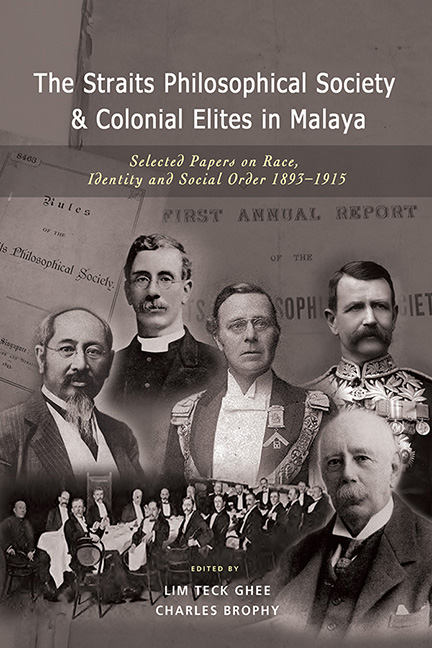 The Straits Philosophical Society and Colonial Elites in Malaya
The Straits Philosophical Society and Colonial Elites in Malaya Published online by Cambridge University Press: 09 January 2024
Editors’ Note
In contrast to Reith’s sentiments, his fellow member Arthur Knight, a prominent civil servant and Freemason, represented the voice of moral reform in the colony. He argued for a duty of moral improvement on behalf of the British Empire and challenged the inevitability of the trade. He also highlighted both the opposition amongst the Chinese to opium use, as well as the evident British interest in the continuation of the trade. At the time of this discussion the British trade in opium was considerable and lucrative so a defence of the continuation of the trade was not unexpected. It has been estimated that opium revenue comprised 43 per cent of the total revenue of the Straits Settlements in 1895. It was not until 1907 when China signed a ten years’ agreement with India—whereby China agreed to forbid native cultivation and consumption of opium on the understanding that the export of Indian opium would decline in proportion and cease completely in ten years—that the trade began to be suppressed. In the Straits Settlements though, the opium trade continued to be a major contributor to government revenue right until the Second World War.
As I said at our last meeting, there is an important distinction between the Indian opium revenue and the opium revenue of this colony. The Government of India is the great grower and manufacturer of opium for sale. In this colony the revenue raised is very much in the nature of an excise, and differs little in principle from the excise on liquor which contributes so largely to the revenue of the mother-country.
I understand that I am expected to furnish some facts bearing on the question as it affects this colony.
First as to the revenue from this source. I shall give in most cases the actual figures, but as the opium and spirit farms are sometimes combined, I have had then to estimate the proportion attributable to the opium. However, my figures will be sufficiently exact for practical purposes.
The transfer of these Settlements from the Indian to the Colonial Government took place on the 1st of April 1867.
To save this book to your Kindle, first ensure [email protected] is added to your Approved Personal Document E-mail List under your Personal Document Settings on the Manage Your Content and Devices page of your Amazon account. Then enter the ‘name’ part of your Kindle email address below. Find out more about saving to your Kindle.
Note you can select to save to either the @free.kindle.com or @kindle.com variations. ‘@free.kindle.com’ emails are free but can only be saved to your device when it is connected to wi-fi. ‘@kindle.com’ emails can be delivered even when you are not connected to wi-fi, but note that service fees apply.
Find out more about the Kindle Personal Document Service.
To save content items to your account, please confirm that you agree to abide by our usage policies. If this is the first time you use this feature, you will be asked to authorise Cambridge Core to connect with your account. Find out more about saving content to Dropbox.
To save content items to your account, please confirm that you agree to abide by our usage policies. If this is the first time you use this feature, you will be asked to authorise Cambridge Core to connect with your account. Find out more about saving content to Google Drive.